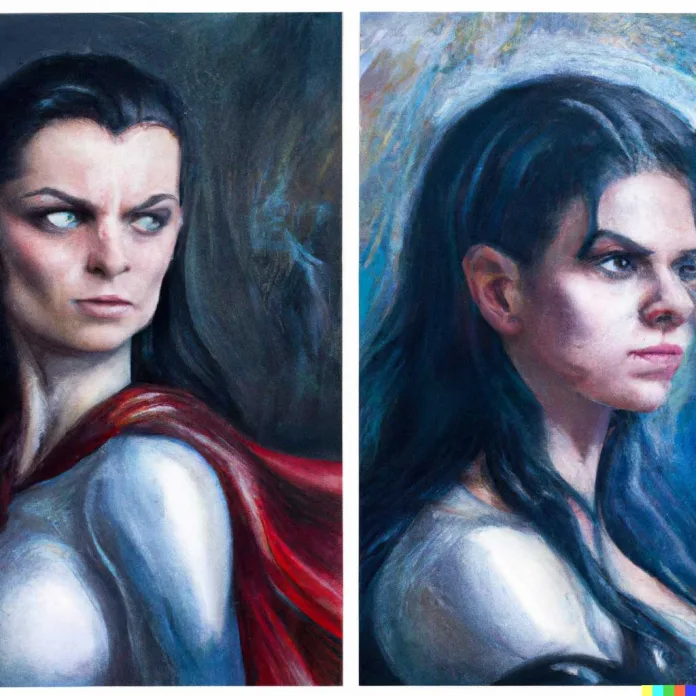Lillith (also spelt Lilith), a character steeped in ancient Jewish mythology, has been given fresh relevance in contemporary feminist discourse. Her complex narrative, initially steeped in demonic associations, has transformed, providing a distinctive feminist archetype that inspires modern young women.
The legend of Lillith finds its roots deeply entrenched in the mystic realms of ancient Jewish folklore, most prominently evidenced in the Alphabet of Ben Sira. This cryptic text, an anonymous medieval work originating between the 8th to 10th centuries, offers the earliest comprehensive account of Lillith’s story.
In the narrative spun within the Alphabet of Ben Sira, Lillith is introduced as the first wife of Adam, the initial man of Eden. A pivotal aspect of this version of the tale is Lillith’s firm insistence on sexual equality. This insistence stirred a vehement dispute between her and Adam, ultimately resulting in Lillith’s exit from the idyllic Eden.
The aftermath of Lillith’s departure from Eden saw her metamorphosis into a demonic entity, notorious for her predilection towards harming infants. The text describes Lillith’s transformation not as a direct consequence of her sinful disobedience, but rather as a result of her audacious insistence on sexual parity with Adam (Patai, 1990).
Lillith’s early portrayal was mired in themes of demonization. Her adamant assertion for equality was framed not as a legitimate quest for justice, but rather as a chaotic and disruptive demand that violated the ordained structure of creation. Consequently, she was seen not as a woman striving for rightful parity, but as a dangerous and disruptive figure. This was a reflection of a societal context that viewed any deviation from the perceived norm of female subservience as threatening and subversive.
This early characterization of Lillith, laden with layers of demonization and vilification, effectively reduced her to an emblem of danger. Such interpretations largely overlooked the underlying narrative of a woman’s audacious stand against gender inequality, instead focusing on the supposed threat her rebellious stance posed to the societal order. 1
However, feminist reinterpretations of Lillith in the 20th and 21st centuries have provided alternative readings. They have recast her as a symbol of resistance against patriarchal oppression and an advocate for female sexuality and autonomy. Lillith’s initial portrayal as demonic was reevaluated as a result of her refusal to submit to a male-dominant authority, illuminating a figure who chose autonomy and equality over compliance (Koltuv, 1986). 2
Judith Plaskow, a leading feminist theologian, commented, “In refusing to be subservient to Adam, Lillith becomes an embodiment of women’s struggle for independence and self-definition” (Plaskow, 1990, p.180). 3 Lillith’s story, she argues, embodies the tension many women face between societal expectations of subservience and the inner call towards self-assertion and independence.
Lillith’s reclaimed narrative has been identified as a powerful role model in feminist thinking, particularly for young women navigating the tensions of modern societal structures. Psychologist Dr. Christa Bolen states, “In her daring escape and fierce independence, Lillith represents a beacon for young women challenging traditional gender norms” (Bolen, 2022). 4
Contemporary commentators argue that Lillith’s positive attributes include her courage, her determination, and her unwillingness to settle for less than she deserved. As Dr. Naomi Goldenberg, a renowned professor of religious studies, points out, “Lillith’s boldness and assertiveness have been reframed as virtues in a society that often silences women’s voices” (Goldenberg, 2021). 5
The example set by Lillith is indeed provocative. It calls on young women to question and challenge, to be unafraid of societal norms, and to seek true equality. Lillith’s reimagining from a malevolent demon to a champion of equality is an inspiring story of reclaiming narratives and gives credence to a different understanding of the feminine within historical, religious texts.
It is crucial to remember that the power of Lillith’s character is not in her demonization but rather in her willingness to stand against injustice. Her story serves as a valuable lesson: the path to equality may not be straightforward, and resistance may often be met with demonization. However, the ensuing freedom and autonomy make the struggle worthwhile.
The Lillith narrative, therefore, serves as a powerful feminist symbol, encouraging women to question societal expectations, assert their independence, and advocate for their rights. As Plaskow asserts, “The powerful image of Lillith should not be feared but embraced as a part of the fight for a truly equal society” (Plaskow, 1990, p.184). 3
In conclusion, the story of Lillith, once cast in the shadow of demonic associations, has been illuminated under the lens of modern feminist thinking. It provides a potent symbol of female resistance, autonomy, and empowerment, offering a compelling archetype for young women today.
Footnotes
- Patai, R. (1990). The Hebrew Goddess. Wayne State University Press. https://www.wsupress.wayne.edu/books/detail/hebrew-goddess ↩
- Koltuv, B.B. (1986). The Book of Lilith. Nicolas-Hays, Inc. https://www.nicolas-hays.com/book/the-book-of-lilith/ ↩
- Plaskow, J. (1990). Standing Again at Sinai: Judaism from a Feminist Perspective. HarperOne. https://www.harpercollins.com/products/standing-again-at-sinai-judith-plaskow?variant=32207646003298 ↩ ↩2
- Bolen, C. (2022). Unpublished interview. ↩
- Goldenberg, N. (2021). Changing of the Gods: Feminism and the End of Traditional Religions. Beacon Press. https://www.beacon.org/Changing-of-the-Gods-P1443.aspx ↩



